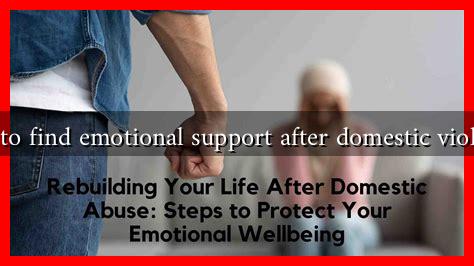-
Table of Contents
- How to Find Emotional Support After Domestic Violence
- Understanding the Impact of Domestic Violence
- Recognizing the Need for Support
- Where to Find Emotional Support
- 1. Professional Counseling
- 2. Support Groups
- 3. Hotlines and Helplines
- 4. Trusted Friends and Family
- 5. Online Communities
- Self-Care Strategies for Healing
- Conclusion
How to Find Emotional Support After Domestic Violence
Domestic violence is a harrowing experience that can leave deep emotional scars. Survivors often struggle with feelings of isolation, fear, and confusion. Finding emotional support is crucial for healing and rebuilding one’s life. This article explores various avenues for emotional support after experiencing domestic violence, providing practical steps and resources to aid in recovery.
Understanding the Impact of Domestic Violence
Domestic violence can take many forms, including physical, emotional, and psychological abuse. According to the National Coalition Against Domestic Violence (NCADV), nearly 1 in 4 women and 1 in 9 men experience severe intimate partner physical violence. The aftermath of such experiences can lead to anxiety, depression, and post-traumatic stress disorder (PTSD).
Recognizing the Need for Support
It’s essential to acknowledge that seeking help is a sign of strength, not weakness. Survivors may feel hesitant to reach out due to shame or fear of judgment. However, emotional support can significantly aid in the healing process. Here are some signs that you may need emotional support:
- Persistent feelings of sadness or hopelessness
- Difficulty concentrating or making decisions
- Withdrawal from friends and family
- Increased anxiety or panic attacks
- Substance abuse as a coping mechanism
Where to Find Emotional Support
Finding the right support system is vital for recovery. Here are several avenues to explore:
1. Professional Counseling
Therapists and counselors who specialize in trauma and domestic violence can provide a safe space to process feelings and experiences. Cognitive Behavioral Therapy (CBT) and Eye Movement Desensitization and Reprocessing (EMDR) are effective therapeutic approaches for trauma recovery.
2. Support Groups
Joining a support group can help survivors connect with others who have had similar experiences. These groups provide a sense of community and understanding. Organizations like the National Coalition Against Domestic Violence offer resources to find local support groups.
3. Hotlines and Helplines
Hotlines provide immediate support and guidance. The National Domestic Violence Hotline (1-800-799-7233) offers 24/7 assistance, connecting survivors with trained advocates who can help navigate their options.
4. Trusted Friends and Family
Reaching out to trusted friends or family members can provide emotional relief. It’s important to choose individuals who are empathetic and understanding. Sharing your story can help alleviate feelings of isolation.
5. Online Communities
Online forums and social media groups can offer anonymity and a sense of belonging. Websites like Reddit’s Domestic Violence Community allow survivors to share their experiences and seek advice from others.
Self-Care Strategies for Healing
In addition to seeking external support, self-care is crucial for emotional recovery. Here are some self-care strategies:
- Practice mindfulness and meditation to reduce anxiety.
- Engage in physical activities like yoga or walking.
- Maintain a journal to express thoughts and feelings.
- Establish a routine to create a sense of normalcy.
- Explore creative outlets such as art or music.
Conclusion
Finding emotional support after domestic violence is a vital step toward healing. Whether through professional counseling, support groups, or trusted friends, survivors can rebuild their lives and regain their sense of self. Remember, you are not alone, and there are resources available to help you navigate this challenging journey. By taking proactive steps and prioritizing self-care, survivors can move toward a brighter, healthier future.

